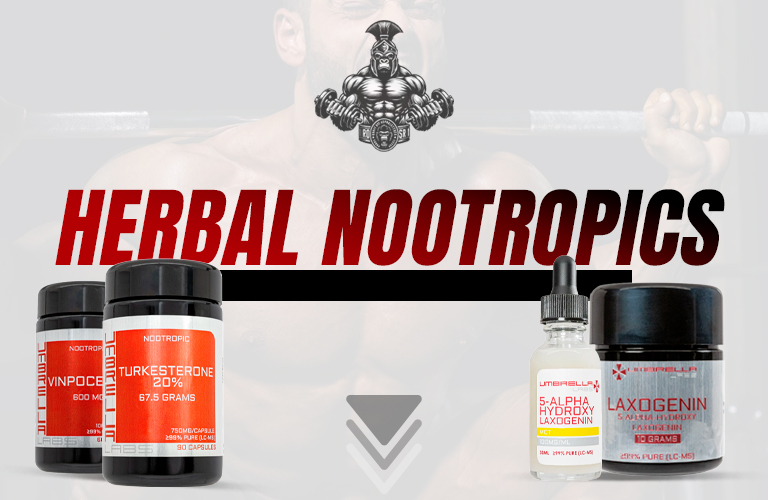
Herbal nootropics are natural cognitive enhancers derived from plants, herbs, and fungi that have been used for centuries in traditional medicine systems to support brain health and improve mental performance. These natural compounds are known for their ability to enhance memory, focus, and overall cognitive function, often with fewer side effects compared to synthetic nootropics. The use of herbal nootropics aligns with a growing interest in holistic and natural approaches to cognitive enhancement, offering a gentler yet effective way to support mental clarity and brain health.
Mechanism of Action: Herbal nootropics work through a variety of mechanisms, depending on the specific plant or herb in question. These mechanisms can include:
Antioxidant Activity: Many herbal nootropics are rich in antioxidants, which help protect brain cells from oxidative stress and damage caused by free radicals. This neuroprotective effect is crucial for maintaining cognitive function and preventing age-related decline.
Neurotransmitter Modulation: Some herbal nootropics influence the levels of key neurotransmitters like acetylcholine, serotonin, and dopamine, which are essential for mood regulation, memory, and focus. By modulating these neurotransmitter systems, herbal nootropics can enhance various aspects of cognitive function.
Improved Cerebral Blood Flow: Certain herbs, such as Ginkgo Biloba, are known for their ability to enhance blood circulation in the brain. Improved blood flow ensures that brain cells receive sufficient oxygen and nutrients, which can boost mental performance and reduce cognitive fatigue.
Adaptogenic Properties: Some herbal nootropics, like Rhodiola Rosea and Ashwagandha, also function as adaptogens. These herbs help the body and mind adapt to stress, reducing the negative impact of stress on cognitive function and promoting mental resilience.
Benefits
Herbal nootropics offer several benefits that make them a popular choice for those seeking natural cognitive enhancement:
Enhanced Memory and Learning: Many herbal nootropics, such as Bacopa Monnieri, have been shown to improve memory retention and learning capabilities. These herbs support the formation of new memories and the retrieval of existing ones, making them valuable for students and professionals alike.
Increased Focus and Mental Clarity: Herbal nootropics can enhance concentration and mental clarity, allowing for sustained focus during tasks that require prolonged attention. Herbs like Lion’s Mane Mushroom are particularly noted for their ability to improve cognitive sharpness.
Mood and Anxiety Regulation: Some herbal nootropics, such as St. John’s Wort and Ginseng, are known for their mood-stabilizing effects. By balancing neurotransmitter levels, these herbs can help reduce anxiety and depression, leading to a more positive and focused mental state.
Neuroprotection and Longevity: Herbal nootropics often provide long-term benefits by protecting the brain from oxidative stress, inflammation, and neurodegeneration. This neuroprotective effect is crucial for preserving cognitive function as we age.
Considerations and Usage While herbal nootropics are generally well-tolerated and come with a lower risk of side effects compared to synthetic compounds, it’s important to use them appropriately. The potency of herbal nootropics can vary depending on factors such as the source of the herb, preparation methods, and individual biochemistry. Therefore, it’s recommended to start with lower doses and gradually adjust based on personal response. Herbal nootropics can be used alone or in combination with other nootropic substances to create a synergistic effect. For example, combining herbal adaptogens with cholinergics or racetams can enhance overall cognitive performance while also providing stress resilience and neuroprotection.
In conclusion, herbal nootropics offer a natural and effective approach to cognitive enhancement. Their wide range of benefits, from improving memory and focus to protecting brain health, makes them a versatile tool for those seeking to optimize mental performance in a safe and holistic way. As interest in natural wellness continues to grow, herbal nootropics are likely to remain a cornerstone of cognitive enhancement strategies.
On the Umbrella Labs website, the available Herbal Nootropics include:
“Bionic SARMs”: Your Ultimate Guide.
Download Now!
This will close in 120 seconds
Underground Oral Steroid Handbook
Download Now!
This will close in 120 seconds
Underground Injectable Steroids Handbook
Download Now!
This will close in 120 seconds
Underground Peptides Handbook
Download Now!
This will close in 120 seconds
Secret to Mail Order Steroids 2024 Handbook
Download Now!
This will close in 120 seconds
Underground Steroid Cycles Handbook
Download Now!
This will close in 120 seconds
Beligas Pharmaceuticals 2024 Underground Guide
Download Now!
This will close in 0 seconds
The Nootropics Underground Handbook
Download Now!
This will close in 120 seconds
EUROPHARMA 2024 Steroid Handbook
Download Now!
This will close in 120 seconds
Para Pharma 2024 Steroid Guide
Download Now!
This will close in 120 seconds
Fitness and Performance Blueprint
Download Now!
This will close in 120 seconds
Geneza Pharmaceuticals Underground Steroid Catalog
Download Now!
This will close in 120 seconds
Lean Body Manual
Download Now!
This will close in 120 seconds
SARMs.co Research Guide
Download Now!
This will close in 120 seconds
Australian Labs Underground Guide 2025
Download Now!
This will close in 120 seconds
SOCIAL MUSCLE eBook
Download Now!
This will close in 120 seconds
SOCIAL MUSCLE FREE EBOOK DOWNLOAD
Secure your copy now — link will be delivered by email.
This will close in 120 seconds
The Wolverine Stack
Secure your copy now — link will be delivered by email.
This will close in 120 seconds
The Wolverine Stack FB
Secure your copy now — link will be delivered by email.
This will close in 120 seconds


